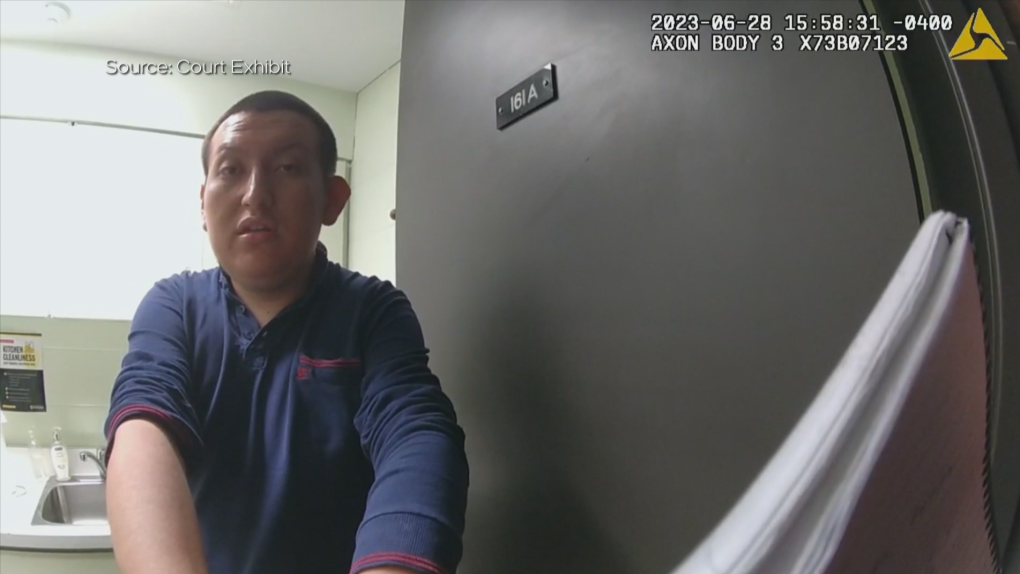'Violence is not good': UW stabber apologizes at end of sentencing hearing
Geovanny Villalba-Aleman, the man who stabbed three people in a gender studies class at the University of Waterloo, says he ‘acted dumb’.
Villalba-Aleman pled guilty to four charges, including aggravated assault and assault with a weapon, for the 2023 attack that injured a professor and two students. At the time he was a 24-year-old international student who had recently graduated from UW.
On Friday afternoon, at the end of his sentencing hearing, Villalba-Aleman addressed the courtroom.
“I just want to make verbal apology to anyone affected. Violence is not good for any reason,” he stood and said. “"Even though people may not believe in my apology ... I acted dumb.”
Villalba Aleman spoke for a few minutes in court. It was his first time speaking during his legal saga, aside from a few words.
"I admit violence is not good,” he added.
Reaction was limited in the Kitchener courthouse where at least one of his victims was in attendance.
At his sentencing hearing this week, court heard from Villalba-Aleman’s victims, a psychologist who evaluated him and, on Thursday, arguments for and against the terrorism charge.
Ideology discussion
Throughout the week, the attacker’s ideology has been the focal point of the legal arguments.
“Struggling with ideology is the key,” Justice Frances Brennan said on Friday. Adding that because he does not have a single clear and identifiable ideological framework, it comes hard to determine if his actions were ideologically driven.
“I’m concerned the definition you are asking me to adopt is so broad we will dilute what we mean by terrorist motivation,” Justice Brennan said.
Howard Piafsky, the Crown prosecutor, said a loosely organized ideology is what terrorism legislation is meant to cover.
“It's not a requirement to show a tidy ideological view,” Piafsky said. “It has to be beyond a personal belief, it has to be beyond just a personal grievance.”
Piafsky said Villalba-Aleman is “obsessed with ideology” and claimed that acting based on ideology meets the threshold of terrorism.
“You can have all types of ideas but you cannot act in a violent way to promote your ideas,” he said in court.
The Defence disagrees and said his actions don’t meet terrorism.
After the hearing wrapped up, Piafsky talked to CTV News and said these cases are rare but important.
“They're important and challenging because terrorist acts of terrorism obviously affect the public in a very substantial way, They're challenging because sometimes they raise questions of law, which are unique and novel,” Piafsky said.
What’s next?
The Crown is recommending a 16-year sentence if Justice Frances Brennan rules Villalba-Aleman’s actions were an act of terrorism, or 13 years if she decides it was hate-motivated. The judge can also reject both options and, if so, federal prosecutors are seeking a 10-year term.
The Defence is seeking a term of five to six years if not terror and hate-motivated and eight years if he’s found guilty of terrorism.
 Police body cam footage shows Geovanny Villalba-Aleman holding out his hands after confessing to a triple stabbing. (Source: Court exhibit)
Police body cam footage shows Geovanny Villalba-Aleman holding out his hands after confessing to a triple stabbing. (Source: Court exhibit)
Police body camera evidence
During an interview with police immediately after the stabbings, he stated he was “doing it on behalf of normal people.” The attack, he added, was meant to be a “wake-up call.”
Disturbing video of Villalba-Aleman’s first interaction with the Waterloo Regional Police Service was played during the plea hearing.
The video showed Villalba-Aleman pretended to be the victim at first, before confessing to the stabbing
“Can you please handcuff me? Because it was me,” he told the officer.
CTVNews.ca Top Stories

BREAKING Donald Trump picks former U.S. congressman Pete Hoekstra as ambassador to Canada
U.S. president-elect Donald Trump has nominated former diplomat and U.S. congressman Pete Hoekstra to be the American ambassador to Canada.
Genetic evidence backs up COVID-19 origin theory that pandemic started in seafood market
A group of researchers say they have more evidence to suggest the COVID-19 pandemic started in a Chinese seafood market where it spread from infected animals to humans. The evidence is laid out in a recent study published in Cell, a scientific journal, nearly five years after the first known COVID-19 outbreak.
This is how much money you need to make to buy a house in Canada's largest cities
The average salary needed to buy a home keeps inching down in cities across Canada, according to the latest data.
Canada's space agency invites you to choose the name of its first lunar rover
The Canadian Space Agency (CSA) is inviting Canadians to choose the name of the first Canadian Lunar Rover.
'My two daughters were sleeping': London Ont. family in shock after their home riddled with gunfire
A London father and son say they’re shocked and confused after their home was riddled with bullets while young children were sleeping inside.
Smuggler arrested with 300 tarantulas strapped to his body
Police in Peru have arrested a man caught trying to leave the country with 320 tarantulas, 110 centipedes and nine bullet ants strapped to his body.
Boissonnault out of cabinet to 'focus on clearing the allegations,' Trudeau announces
Prime Minister Justin Trudeau has announced embattled minister Randy Boissonnault is out of cabinet.
Baby dies after being reported missing in midtown Toronto: police
A four-month-old baby is dead after what Toronto police are calling a “suspicious incident” at a Toronto Community Housing building in the city’s midtown area on Wednesday afternoon.
Sask. woman who refused to provide breath sample did not break the law, court finds
A Saskatchewan woman who refused to provide a breath sample after being stopped by police in Regina did not break the law – as the officer's request was deemed not lawful given the circumstances.


































